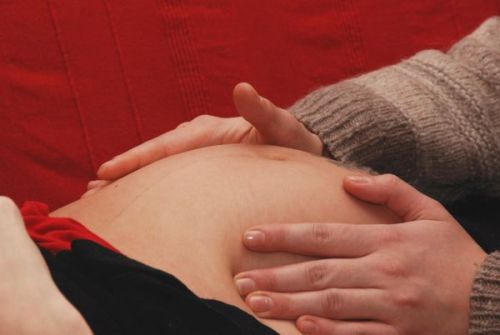Home birth | Procedure
 If you are generally interested in a home birth, you should contact a midwife/midwife team as early as possible to get to know each other in an initial non-binding discussion, clarify initial questions and find out together what your needs and options are and how they can best be met.
If you are generally interested in a home birth, you should contact a midwife/midwife team as early as possible to get to know each other in an initial non-binding discussion, clarify initial questions and find out together what your needs and options are and how they can best be met.
Contact the homebirth midwife of your choice as early as possible for a meeting/consultation. If you are not yet sure whether a home birth or a hospital birth is the better choice for you, it can also be very helpful to attend the lecture “Zu Hause gebären - Fakten, Erfahrungen und Diskussion" (in German). There, an experienced home birth midwife describes a typical process and is happy to answer any questions, big or small, on the subject. This often helps you to better visualize a home birth and its implications.
If you decide to have a home birth, you will discuss a care plan with your midwife(midwives). This usually includes at least four home visits during pregnancy (for antenatal care as well as planning and preparation for birth and postpartum), up to five weeks on call from three weeks before the due date, birth care at home and postpartum visits in the first few weeks after the birth.
During pregnancy, the midwife (or midwives) will look after you in addition to the gynecologist* and check that you are healthy and that your baby is developing normally. She will also advise you on questions about nutrition, exercise, antenatal classes, unclear examination results, etc. and will listen to your questions and concerns. At the Hebammenzentrum, we also offer birth preparation courses for home births (in German).
Birth support at home extends from the start of labor or rupture of the membranes to the first few hours with your child. The midwife will look after you sensitively and professionally and try to ensure that you have as self-determined, safe and harmonious a birth as possible, with as little intervention as possible, in line with your own needs and expectations. If support is needed, simple “interventions” often help, such as a warm bath to relax you, eating and drinking to strengthen you, exercise or certain positions to positively influence the baby's posture, breathing techniques, etc. However, certain alternative and conventional medicines can also be administered at home if necessary.
After the birth, the midwife will not leave you alone until she has made sure that you and your baby are well, that you have had your first feed, that you are well cared for and that the first postnatal visit has been arranged. You will probably already be freshly showered and fortified, the three of you snuggled up together in bed marveling at each other or sleeping, the washing machine running, the garbage disposed of ... when the midwife closes the door behind her.
The midwife will normally visit you every day for the first few days of the postpartum period and then according to your needs. During each visit, she will check that you are both doing well (baby: umbilical healing, breastfeeding, newborn jaundice, routine tests such as metabolic screening...; mother*: uterine involution, bleeding, healing of birth injuries, breastfeeding, psychological changes...), discuss any questions and concerns and provide you with advice and support during this time of change.
A final discussion often takes place at the end of the postpartum period to round off the care together, review the past events and clarify any questions that may still be unanswered.
Detaillierte Infos zu



